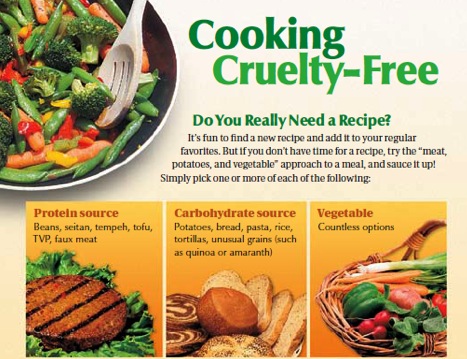
We can be Healthy without Animal Products
It is absolutely clear that we do not need animal products to eat a healthy diet. There is evidence of this in the growing number of vegans from all walks of life who are easily getting all of their required nutrients without animal products. This is also being recognised by mainstream health organisations such as the American Dietetic Association, whose position is that:
‘Appropriately planned vegetarian diets, including total vegetarian or vegan diets, are healthful, nutritionally adequate, and … appropriate for individuals during all stages of the life cycle, including pregnancy, lactation, infancy, childhood, and adolescence, and for athletes.’
Health Benefits of a Vegan Diet
The American Dietetic Association not only state that a diet free of animal products can be very healthy, but they also point out the health benefits of removing animal products from your diet. They point out that doing so ‘may provide health benefits in the prevention and treatment of certain diseases.’
The China Study came to similar conclusions. Unlike many studies whose “sample size” is too small to be able to reach reliable conclusions, this was an extremely comprehensive study. It involved a survey of 6 500 Chinese people, who each contributed 367 facts about their diet.[1] This study found that: ‘People who ate the most animal-based foods got the most chronic disease … People who ate the most plant-based foods were the healthiest and tended to avoid chronic disease…’ It also found that the opposite was true. The move away from a traditional Chinese diet to a more “Westernised” diet higher in animal products in some regions of China was accompanied by an increase in “diseases of affluence” such as cardiovascular disease, cancer and diabetes.[2]
Cholesterol is only found in animal products. Our body produces all of the cholesterol that we will ever need, so we don’t need to consume any further cholesterol in our diet. As the Physicians Committee for Responsible Medicine notes, there are ‘health risks’ associated with eating products containing cholesterol and eating a plant-based diet dramatically lowers the risks of heart disease, cancer, and strokes. A recent study also concluded that a low fat vegan diet is better for cholesterol control than a Mediterranean diet.
Eating a Healthy Vegan Diet
As the American Dietetic Association notes, vegan diets must be ‘well-planned’ to be healthy. This does not mean working out exactly how much of every single nutrient in your diet, but it does mean that it is important to eat a variety of foods.
The Physicians Committee for Responsible Medicine has introduced The New Four Food Groups. ‘This no-cholesterol, low-fat plan supplies all of an average adult’s daily nutritional requirements’ including ‘nutrients once only associated with meat and dairy products—namely, protein and calcium.’
These four food groups include fruits, whole grains (such as bread, rice, pasta and cereal), legumes (such as beans, lentils, chick peas and soy products), and vegetables. Obviously vegans eat their fruit like everyone else. The other three groups can be easily be achieved by eating “balanced meals” for most lunches and dinners. Balanced meals contain a source of carbohydrate, protein and vegetables. Vegan Outreach explain how you can create vegan versions of your favourite meals and even offer a 10 weeks to vegan program.

This gives an endless number of meals that can be created: tortillas with kidney beans and vegetables; pasta with lentils and vegetables; rice with tofu and vegetables; vegan burgers with salad; tacos with refried beans and salad…
The only nutrient that does not occur naturally in plant-based foods is B12. This is an important but very easily resolved issue for vegans. Some vegans do not take any vitamins and get their B12 from sources such as soy milk enriched with B12. Many soy milks contain 50% of your required B12 per serve, meaning two serves most days meets your requirements. If you are not consuming enough of B12 fortified products, then this is still not a problem, simply take a B12 supplement. Your body stores B12 for a long time, so this is not an issue that needs to be resolved the day you become a vegan, but is definitely something that should be sorted out in the long-term.
For Further Information on Vegan Health:
- Visit NutritionFacts.org to learn about how a plant-based diet can improve health.
- Watch What the Health documentary.
- See the Physicians Committee for Responsible Medicine’s Vegan Starter Kit, this information tells you how to eat a totally plant-based (vegan) diet, free of all animal products.
- Read up on vegan diets for athletes.
- Watch The Game Changers Movie which is currently available on Netflix.
- You can listen the talk that this article is based on: Nick Pendergrast ‘Living Healthy and Cruelty-Free‘.
[1] This summary of The China Study was taken from pages 276-277 of the book A Sociology of Food & Nutrition: The Social Appetite, from chapter 12 ‘Humans, Food, and Other Animals: The Vegetarian Option’ by Deidre Wicks (pages 263-287).
[2] Wicks, pages 276-277.
